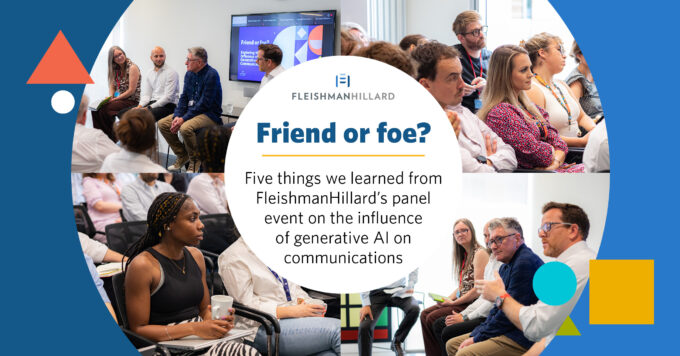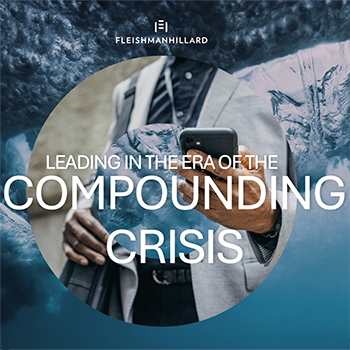
Few people had heard of generative AI this time last year, but since ChatGPT launched in November it’s generated an incredible amount of attention from the media and social media – not all of it helpful or sober – and raised question after question about what it means for the future of communications.
To try and provide some answers and clarity, FleishmanHillard UK recently hosted a panel event featuring four experts, each with their own distinct take on the subject. Gregor Schermuly, GM and Head of Product at OSK Berlin, brought the deep tech knowledge. Kate Russell, a journalist and educator and a former presenter on the BBC’s Click, represented the media. Charles Proctor, Managing Consultant at Credera, brought the advertising and creative perspective, while our very own Pete Wilson, FleishmanHillard EMEA’s Head of Digital Reputation, has been leading conversations about what generative AI might mean to communicators.
Here are five takeaways from a wide-ranging conversation, which was moderated by FH’s Head of News Pete Meikle.
- Generative AI could democratise skills that are in short supply
According to Charles, advertising suffers from a shortage of copywriters – meaning that tools like ChatGPT could produce multiple copy approaches almost instantly, potentially making concepts like hyper-personalisation in marketing a reality. In this and other use cases, the generative AI wouldn’t be taking jobs, but rather giving people the capacity to do more. The panel was quick to make the point, however, that using generative AI at this scale would require a framework and moderation to manage brand reputation. After all, no boss would instantly publish the work of 30 junior copywriters.
- Disinformation is our biggest threat
There was some criticism of how the media has reported the rise of generative AI so far, with Kate pointing out that we all need to “play down the ‘end of the world’ thing”. But the panel was unanimous in its view that the media and social influencers need to be the public’s bulwark against disinformation, with Pete raising the challenge of CEOs or other leaders being impersonated using generative AI tools, with potentially huge reputational impact on their brand.
- The kids are alright
Rather than facing up to a world without jobs, the panel had faith in young people’s ability to shape a new world with the tools available to them. Gregor explained that being exposed to generative AI tools and using them over and over again is the first step to developing the right skills to be effective with them, and Kate recalled the energy she saw from a class of 12-year-olds learning Midjourney prompts and quickly grasping the potential of their creativity. The panel were also united on the need to ensure young people entering our industry continue to be trained in communications foundations – the skills and understanding that will help them get the most out of generative AI tools.
- ‘Excellent’ just got harder
Generative AI’s potential for scale means that there’s going to be a flood of average-to-good content out there, with a lot of potential for “sameyness”. That brings some things to watch out for – it could lead to more extreme and misleading content as brands and individuals strive to stand out, and there could be a glut of “safe” marketing and communications campaigns that just follow what the generative AI suggests. What generative AI won’t do, though, is tell you what the best idea is, and the panel agreed that agencies and clients need to continue to believe in the power of human creativity to separate the great campaigns from the merely good enough.
- Beware the shiny new thing
Everyone in our industry loves the latest innovation – from the birth of the internet to the iPhone and social media, marketing and communications agencies and their clients have always been early adopters of new technology and been keen to put it to use as quickly as possible. But what we don’t want to do is just use the shiny new thing because its shiny and new. It’s still got to be about identifying the audience or client challenge first and thinking about the best way to solve it with the tools at our disposal, rather than going looking for any old way to use generative AI.
By James de Mellow, Director, Technology practice, FleishmanHillard UK
Find Out More
-
Leading in the era of the compounding crisis
October 2, 2025
-
AI in the Newsroom
August 26, 2025


